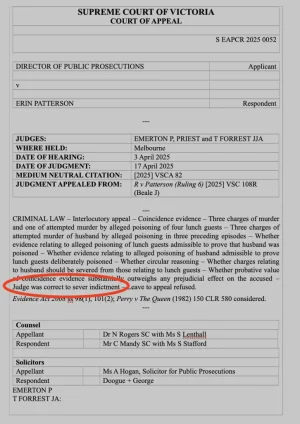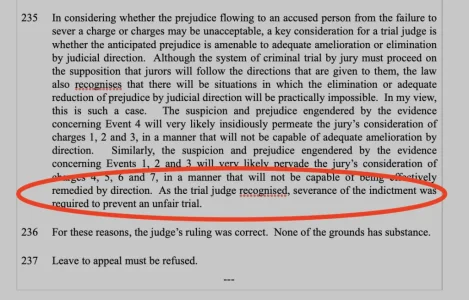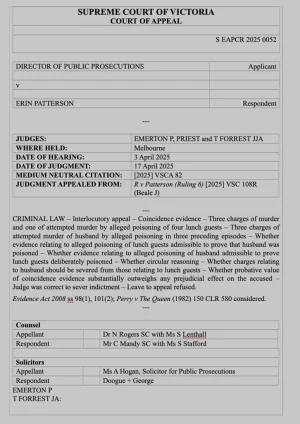- I also consider that the evidence of Events 1, 2 and 3 is inadmissible as coincidence evidence in proof of the fact that Donald Patterson, Gail Patterson, Ian Wilkinson and Heather Wilkinson were deliberately poisoned. Since the cause of Simon Patterson’s gastrointestinal disturbance is indeterminable, and the fact that he fell ill after consuming food prepared by the respondent is no proof that he was poisoned, the facts founding charges 1, 2 and 3 cannot properly be considered coincidence evidence capable of going in proof of charges 4, 5, 6 and 7. In my view, in order to use the events founding charges 1, 2 and 3 in proof of the disputed fact on charges 4, 5, 6 and 7, it must first be assumed that the respondent deliberately poisoned Simon Patterson. But in circumstances where the cause of his gastrointestinal disturbance cannot be determined, to endeavour to use the evidence in that way would be fallacious. It would involve circular reasoning, permitting impermissible speculation to displace legitimate inference. Plainly, in my view, the evidence does not have significant probative value, substantially outweighing any prejudicial effect it would have on the respondent.
The decision to drop the charges was based on the lack of evidence proving the cause/s of Simons illness. This was the right decision to make as without a clear cause being determined we are at risk of prejudicial speculation.
What this is saying is that the pre-lunch alleged poisonings of Simon cannot be used as coincidence evidence
to prove the lunch poisonings of the others. Had the prosecution not wanted to use it as coincidence evidence, what then?
Consider what they might have said if Simon had toxicology results proving he had ingested poisons. I still think they would have said it was prejudicial in determining her intent as regards the others. More so in fact.
But what if the prosecution had not wanted to use the evidence of any one single incident as coincidence evidence to prove the other charges? It doesn't make sense in their ruling that effectively Simon can never attempt to get justice for alleged crimes against him. If he had a trial now the same facts of the, now proven, lunch poisonings would still be highly prejudicial, as coincidence evidence. Juries have to be trusted to be able to consider multiple alleged crimes on their own merits. I think the court of appeal ruling was, to use their own description, fallacious.
There was more than
just several indetermined bouts of critical illness after eating Erin's food to consider. There was -
1/ The ruling out of other usual causes (gastro) and the damage it did to his organs and the fact it was life-threatening and he was usually healthy, not a vulnerable, elderly or immune-compromised person.
2/ The fact that it never happened to Simon in 50-odd years of his whole life when he ate apart from Erin.
3/ The fact they were separated and these were attempts at holidaying together, on their first nights, when she really didn't want to reconcile because she booted him out shortly afterwards and was messaging people about hating him.
4/ His food was kept separate and distinguishable from hers, plus the children were kept separate.
5/ She had searches on her devices for poisons.
6/ He had spoken to his doctor and his parents about his suspicions of her poisoning him
before the fatal lunch.
7/ He had prepared a spreadsheet for his doctor and changed his medical power of attorney (if that's the right
terminology).
8/ He avoided eating her food after that and declined the invitation to the lunch even when he considered she could be terminally ill, because he was no longer prepared to take that risk.
9/ Erin never got sick.
10/ Erin apparently didn't want to co-parent, and she didn't want to divorce either.
IMO



